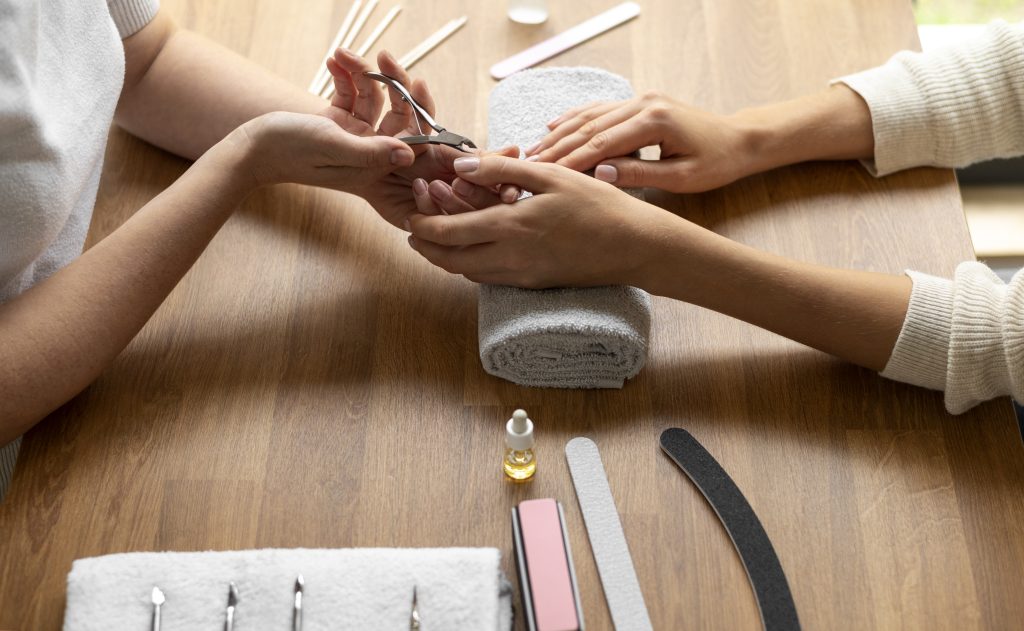
When people search for nail salons near me, they often hope to find more than just a simple polish change. A professional nail salon today provides a complete beauty and spa-inspired environment where clients can rejuvenate, pamper themselves, and enjoy exceptional care. With highly skilled technicians, premier services, and relaxing treatments, these salons transform routine appointments into memorable experiences.
The Growing Appeal of Nail Salons Near Me
Visiting a nail salon near you isn’t only about convenience. Modern salons combine artistry with spa-quality care, offering a setting where customers can relax and enjoy treatments that go beyond nails. Whether it’s a manicure, pedicure, or additional beauty service, these locations create an environment designed to make every client feel welcome.
Why Local Nail Salons Stand Out
- They are located conveniently, saving time and stress.
- They combine nail care with wellness for a great overall experience.
- Customers benefit from an industry that prioritizes cleanliness and professionalism.
Spa-Inspired Manicures for Lasting Beauty
A manicure is more than a beauty treatment; it’s an essential part of nail care. At a quality nail salon near you, every step of the manicure process is designed to keep your nails healthy and your hands beautiful.
What Manicures Include
- Nail shaping and cuticle treatment.
- Gentle exfoliation to rejuvenate the skin.
- Hydrating massage to help clients relax.
- Choice of polish, from traditional colors to durable gel polish.
For those who want longer-lasting results, acrylic or gel enhancements are also available. These options allow clients to express their style with confidence while receiving professional nail care.
Pedicures That Pamper and Rejuvenate
Pedicures offered at a nail spa provide more than polish. They help refresh tired feet and deliver a relaxing, spa-like experience. With warm soaks, exfoliation, and hydrating masks, pedicures restore comfort and beauty.
Pedicure Services Often Include
- Cleansing foot soak to relax muscles.
- Callus removal for smooth skin.
- Hydrating masks and massage to rejuvenate feet.
- Color or gel polish application for a polished finish.
Many salons also offer premier services like paraffin wax dips, hot stones, or aromatherapy enhancements, ensuring every pedicure feels luxurious.
The Role of Skilled Nail Technicians
Behind every beautiful set of nails is a well-trained technician. Highly skilled technicians know how to balance beauty, health, and safety to give clients the best experience possible.
What Sets Technicians Apart
- Training in acrylic, gel, and dip powder services.
- Ability to create professional designs that reflect personal style.
- Knowledge of the best products for strong, healthy nails.
- Providing exceptional customer care in a safe and clean environment.
Clients trust these professionals not just for their skill but also for the way they make each customer feel comfortable and valued.
Spa-Like Extras That Elevate Nail Care
When visiting a nail salon near you, it’s not just about the manicure or pedicure—it’s about the entire experience. Many salons incorporate spa-like extras that pamper clients and create an exceptional environment.
Enhancements to Look For
- Wax treatments for smooth hands and feet.
- Relaxing massages to help clients unwind.
- Eyelash extension services for a complete beauty routine.
- A gallery of nail art designs to inspire creativity.
These details combine to create one of the best nail experiences, turning a simple appointment into a rejuvenating escape.
Why Customers Keep Coming Back
When customers find the best nail salon, they know it’s more than the results—it’s the atmosphere, professionalism, and consistent quality that matter. Salons that focus on both nail care and customer satisfaction become one of the best nail choices for clients who want lasting beauty.
What Encourages Loyalty
- Professional service and attention to detail.
- Highly skilled technicians who understand customer needs.
- A welcoming environment that feels like a spa.
- Premier services designed to pamper and rejuvenate.
This combination ensures that every client feels valued and leaves with nails that are not only beautiful but also healthy.
Discover Spa-Inspired Nail Care at Uniquely Herrs
If you’ve been searching for nail salons near me that provide spa-quality treatments, it’s time to visit Uniquely Herrs.
Uniquely Herrs, located conveniently in Springfield, Missouri, is proud to offer manicures, pedicures, gel polish, acrylic enhancements, nail designs, and more. With over 15 years of experience and a Master Nail Technician, our salon is recognized for exceptional service, premier treatments, and a relaxing environment.
Clients are welcomed into a space designed for beauty and relaxation, where well-trained professionals provide one-of-a-kind care. From eyelash extensions to creative nail art, every service is crafted to rejuvenate and pamper, making us one of the best nail spas for those who value quality and style.
Ready to experience professional nail care that goes beyond the basics? Contact Uniquely Herrs today and let our highly skilled technicians deliver beautiful results you’ll love.

Nail Salon and Eyelash Extensions | Uniquely Herrs
3433 S Campbell Ave Suite L1, Springfield, MO 65807
(417) 619-4895

